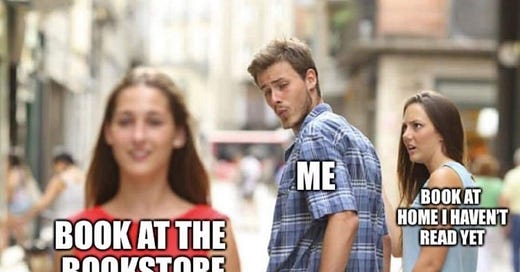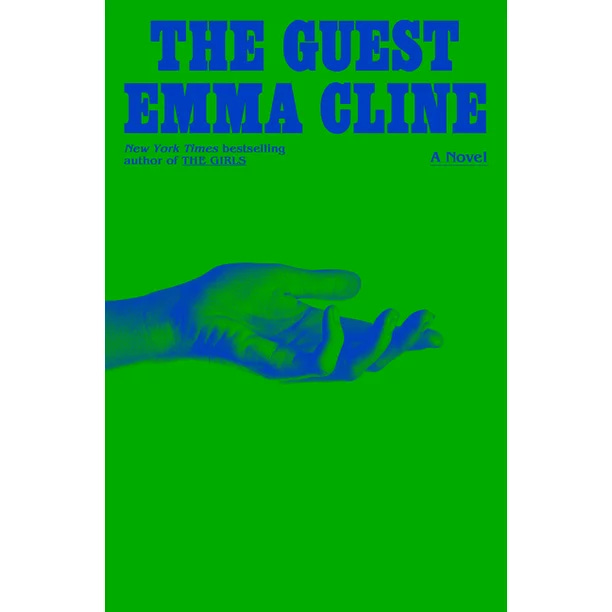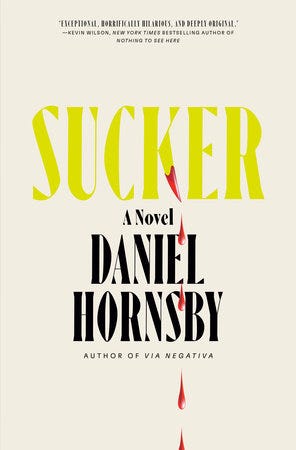My reading life is chaos. How's yours?
Five recent reads, rated on a scale of seventeen to pork chop
My reading life these days is….weird.
I used to be a strict one-book-at-a-time kind of gal, but now I’m all the hell over the place. Today’s multichannel publishing landscape (haha that sounds like something I’d write for one of my corporate clients) is largely to blame.
At any given time, I’ve got one book on my Kindle, accessible on my phone in case I find myself with unexpected time to kill. I almost always have an audiobook in progress, which I’ll listen to while driving, running, walking, or cleaning the bathroom. Then there’s whatever I happen to be reading in hardcover or paperback, which these days is often two or three things at once.
Meanwhile, I feel like there’s a firehose of books coming at me these days: books of friends / acquaintances, books thrown my way by my publisher, books that friends thrust lovingly into my hands because I have to read them, books I didn’t plan to buy that wink at me from the “New Fiction” tables at bookstores, and, of course, the many, many unread books on my shelves.
As a result of all this, I am frequently stymied by indecision. I have trouble with commitment, and often put books down after a couple of chapters because it just doesn’t “feel right” at the time, or because I feel like I really should get to that other book I’ve been meaning to read instead.
It’s not you, book, I would say, were I in the habit of talking to books. It’s me.
But this is a silly problem, and I need to get over it. There is no wrong thing to read, and having unread books on one’s shelves is not a sin. I will never have time to read all the books I want to, and I should accept that, rather than letting it stress me out. Right? Right. Deep breaths.
Anyway. To change things up around here, I thought I’d share a few of the most recent reads/listens from my messy reading life, in no particular order, very carefully and accurately rated.
The Guest by Emma Cline
This was one of those buzzy new novels that, when I heard about it, I thought: Oh yeah, baby, I’m coming for you with my next Audible credit. It’s about a young sex worker, Alex, who finds herself suddenly sugar-daddy-less, moneyless, and essentially homeless. With little other choice, she drifts through the moneyed world of the Hamptons, using her looks and whiteness (this isn’t explicitly discussed in the book, but it’s very much true) to slip into various families and homes and groups of friends, subtly conning people into thinking they know her, or that she knows someone they do. It’s sad and suspenseful and strangely mesmerizing, and you’re constantly wondering how and when Alex’s cover is going to be blown, while also hoping that somehow she’s going to land on her feet.
Rating: I hate book ratings. HATE them. And I swear I’m not saying that just because I am an author, and my work is subject to them, and they actually affect how many books I sell. It’s just deeply weird to me, and always has been, to reduce art and entertainment to rubrics. What am I rating, exactly, when I rate a book? How moved I felt? How much I laughed? How fast I turned pages? In what universe does it make sense to use the same rating scale to evaluate The Great Gatsby and Gone Girl and Knitting for Dummies?
But, fine, if I must rate The Guest, I give it six pairs of designer sunglasses, a charcuterie board, and a Vicodin.
Sucker by Daniel Hornsby
Daniel Hornsby is a fellow Vintage/Anchor author, and he has the same (fabulous) editor as I do, Anna Kauffman. So, obviously I had to read this, because I know what great taste Anna has. (Heh heh.) Also, it sounded right up my alley: a satire of Silicon Valley and the one percent, with a little horror/mystery in the mix for good measure. If you don’t like voice-y fiction, this may not be your thing; the story is filtered through a first-person narrator with a wry, hipsterly bent who tosses around lots of cultural and musical references. I think 25-year-old me might have rolled my eyes. But 49-year-old me found it a lot of fun. And how can you not appreciate a narrator who likens zebras (his billionaire father’s loathesome pet of choice) to alcoholic penguins? If you appreciate a good skewering of capitalism, you are fascinated and repelled by the Elizabeth Holmes story, and you kinda sometimes wish you were a vampire, check this one out.
Rating: Negative four zebras
My Murder by Katie Williams
This was a perfect-for-audiobook novel—thriller-ish and fast-moving, with an intelligent, darkly comic tone. Bonus: I really liked how the audiobook narrator said the word “murder.” A sort of languid, old-timey MEUHRR-dur. Which is ironic since it’s not an old-timey book at all; rather, it’s set in an undefined but not-too-distant future. The protagonist, Lou, and five other women, all of them MEUHRR-der victims, are brought back to life—sort of. As Lou adjusts to her return to her her job, her marriage, her baby daughter, she starts to suspect that things aren’t quite what they seem. Bum, bum, BUM!!! If there was a movie adaptation of this book and one of Sucker, they’d make an excellent double feature. Instead of Barbenheimer, we could call it SEUUHHcker.
Rating: π r2
The Brothers Karamazov by Fyodor Dostoevsky
Look, don’t be impressed, really. Because I don’t know if I’m ever going to get through this puppy. It’s 960 pages long, and it takes me about an hour to read ten pages, because I have to keep stopping to check the endnotes (if there’s an endnote in a book, I feel duty-bound to read it) and/or backing up to make sure that, wait, which one is Miusov? Is Dmitry the same person as Mitya? Which Fyodor are we talking about? I do love the prose and the arch humor and the razor sharp characterization. But reading it definitely feels like work. And the fact that it does makes me sad.
When I was in college, and in my twenties, I read a lot more classics, and was able to feel fully absorbed and invested in them—even the big, dense, nineteenth-century ones. I had more time and fewer responsibilities, yes, but I also think my brain was less fragmented by the internet and information overload. I’m reading Karamazov in part because I want to prove to myself that I still can read Big Fat (or not so fat) Classics. And also, because I miss the sense of hunger and wonder and freedom I had back in the days when I read Anna Karenina during my lunch break at my first job or Middlemarch at a cafe in Quito or East of Eden on the fire escape of my first apartment on a sunny Saturday afternoon.
Goddammit.
Rating: A Solo cup of cheap shiraz, a knockoff Rachel haircut, and a two-hour breakfast at a diner in Somerville, pre-total-gentrification .
Lost & Found by Kathryn Schulz
I appreciate having a book I can dip in and out of when the mood strikes (although, admittedly, it adds to the chaos of my reading life), and this wise yet humble meditation on love and loss and the inextricably linked nature of the two was exactly that. Schulz writes about two events that happened in close proximity in her life: losing her father and meeting the woman she would marry. Again and again as I read, I found myself nodding and thinking (wistfully) “Oh, yes, that’s exactly it, isn’t it?” or, in one case, writing “YES!” on the page. I mean, look at this:
“….these last few years, I have been even more susceptible than usual to emotion—or, rather, to one emotion in particular. As far as I know, it has no name in our language, although it is close to what the Portuguese call saudade and the Japanese call mono no aware. It is the feeling of registering, on the basis of some slight exposure, our existential condition: how lovely life is, and how fragile, and how fleeting. Although this feeling is partly a response to our place in the universe, it is not quite the same as awe, because it has too much of the everyday of it, and too much sorrow, too. For the same reason, it is also not the feeling the Romantics identified as the sublime—a mingling of admiration and dread, evoked by the vast impersonal grandeur of the physical world. This feeling I am talking about has none of that splendor or terror in it. It is made up, instead, of gratitude, longing, and a note I can only call anticipatory grief.”
RIGHT??
Rating: Oh, shut up.
I feel like at this point I should say something like “what have you read lately that you liked? Share in the comments!” I am nervous to do so, however, because surely you will mention some books that sound truly fabulous, and I will feel even more overwhelmed and indecisive. But, fine. Bring it. Bring ALL the books.
All posts on Jane’s Calamity are free and publicly available, but writing is how I make my living. If you like this weird-ass newsletter, please consider upgrading to a paid subscription so I can buy more books. (Obviously.)
P.S. I’ve got some new events on the horizon! This Thursday night, 7/27, I’ll be in my hometown of Fairfield, Connecticut, at a benefit cocktail thingy for the Fairfield Public Library. Buy a ticket, put on something pretty and come! (And be sure to bring your fan, ‘cuz it’s gonna be hot.) Then, on August 9, I’ll be at Book Ends in Winchester, Mass, in conversation with the sublime Ms. Randy Susan Meyers, whose books you should read and whose Substack you should check out. (If I’m not mistaken, there will be wine at this event.) You can also catch me via Zoom on August 17, courtesy of the Watertown Public Library.
P.P.S. The Society of Shame (Rating: 4.5 Swans and a chilled dessert soup, but I’m biased) is Zibby’s Book Club pick for August! I’ll be doing a live Q&A on August 8th at 1:30 pm ET. Sign up here to join.
P.P.P.S. Here are a few other things I’ve read / am reading / am about to read lately — unrated! — if you’re curious.
Yellowface by R.F. Kuang (read)
Brotherless Night by V.V. Ganeshananthan (just started reading)
The Stranger in the Woods by Michael Finkel (just finished listening)
House of Cotton by Monica Brashears (next on my nightstand)
How Can I Help You by Laura Sims (about to start listening)











Great post. I will be there to see you at BookEnds on Aug 9!
I love that quote from Lost and Found--thank you for sharing! Books: The Covenant of Water by Abraham Verghese; Memory of Animals by Claire Fuller; and I am still recommending Henriette Lazaridis’ Terra Nova.